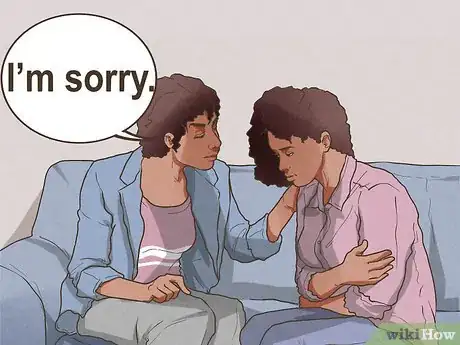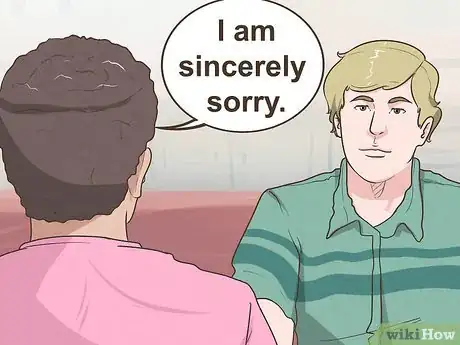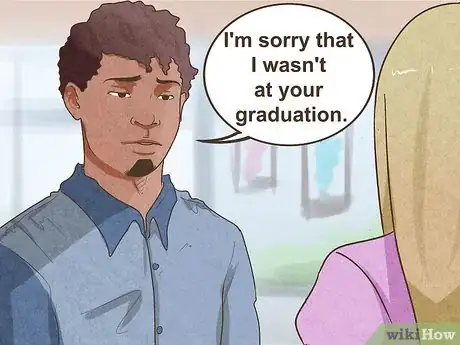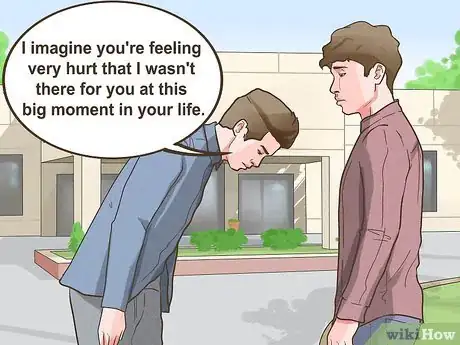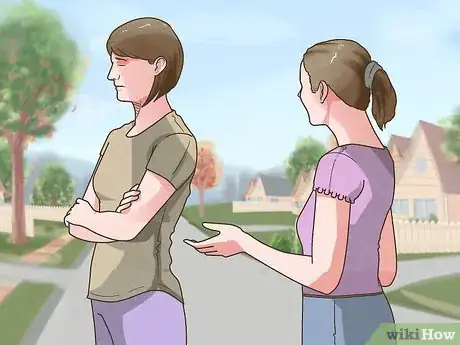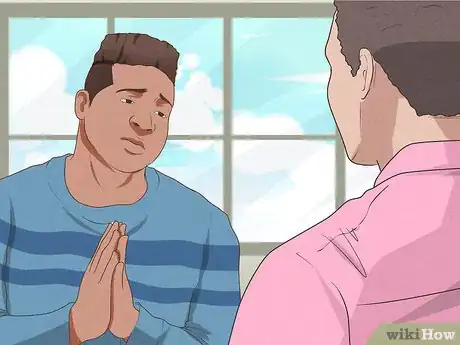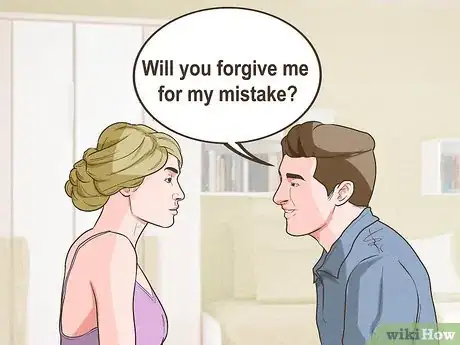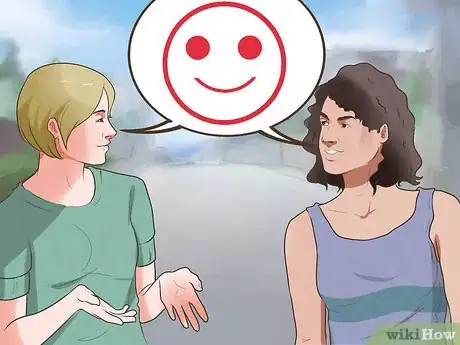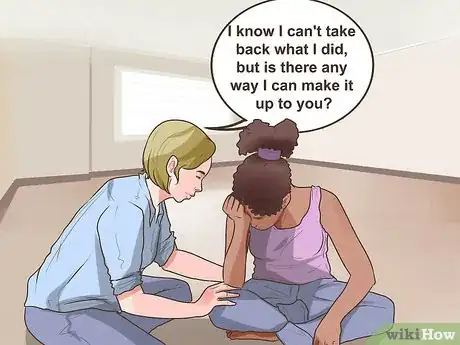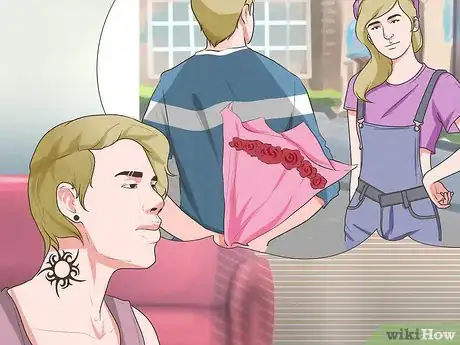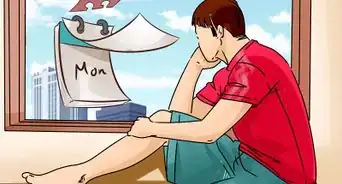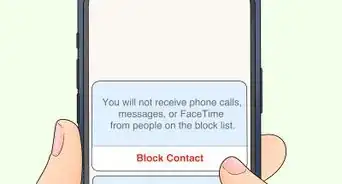This article was co-authored by Lena Dicken, Psy.D. Dr. Lena Dicken is a Clinical Psychologist based in Santa Monica, California. With over eight years of experience, Dr. Dicken specializes in therapy for anxiety, depression, life transitions, and relationship difficulties. She utilizes an integrative approach combining Psychodynamic, Cognitive Behavioral, and Mindfulness-based therapies. Dr. Dicken holds a BS in Integrative Medicine from the University of Hawaii at Manoa, an MA in Counseling Psychology from Argosy University Los Angeles, and a Doctor of Psychology (Psy.D) in Clinical Psychology from the Chicago School of Professional Psychology at Westwood. Dr. Dicken’s work has been featured in GOOP, The Chalkboard Magazine, and in numerous other articles and podcasts. She is a licensed psychologist with the state of California.
There are 9 references cited in this article, which can be found at the bottom of the page.
This article has been viewed 143,157 times.
Disappointing or upsetting a friend puts you in a difficult position. You hate that you hurt your friend, and now she is mad at you for it. The best option you have is to apologize to your friend, sincerely and completely.
Steps
Apologizing for the Problem
-
1Apologize sooner rather than later. If you wait too long, your opportunity to help mend things will pass. That is, your friend may get angrier the longer you wait to apologize. It's hard to swallow your pride, but it's important to put your relationship first. That means apologizing as soon as you can.[1]
- The longer you wait to apologize, the guiltier you'll feel, and it's not good for your own mental health to wait that long.
- Of course, you do want to wait until you can be sincere. If you can't offer a sincere apology, it's not going to mean much.
-
2Start with "I'm sorry." Saying "I'm sorry" is both the easiest and hardest part of apologizing. It's just one little sentence, but it can be hard to get out. It's the best way to start an apology, though, because it establishes upfront that you want to make amends.[2]
- Of course, you don't need to use that exact phrasing. You could also say, "I apologize," or, " I am sincerely sorry."
Advertisement -
3Admit your mistake. You also need to admit to what you actually did wrong. It's not enough to just say "I'm sorry." You also have to say what you're sorry for, as that shows you are accepting responsibility for exactly what you did, not making some blanket statement to try to make things better.[3]
- For example, you could say, "I'm sorry that I wasn't at your graduation."
- Alternatively, you could say, "I apologize for talking about you behind your back."
-
4Be sincere. Your best friend knows you well and is going to be able to tell whether you are being sincere or not. You really need to own your apology for it to mean something. Plus, your friend is more likely to accept your apology if you are sincere.[4]
- One part of owning your apology is making sure you don't try to explain away your behavior. If you try to offer excuses, that takes away from the sincerity of your apology. Saying "I'm sorry, but..." can negate the power of your apology.
- Avoid being defensive. When you're making an apology, it can be easy to slip into defensiveness. After all, if you've fought with your best friend, it's likely you're both to blame in the situation; however, when you're apologizing, you're taking blame, so you can't be defensive at the same time.
-
5Show your remorse. Showing remorse is acknowledging that you caused the other person harm, in your words and body language, such as "I know you expected me to be at your graduation. I imagine you're feeling very hurt that I wasn't there for you at this big moment in your life." Another option is, "It was a horrible thing for me to do, to talk about your private life to other people, and I should know better. I know you must be very upset and hurt."[5]
- This is your best friend, so make sure he knows how much his friendship means to you. Try something like, "You are my closest friend, and your friendship is incredibly important to me."
- Make it clear that you understand how they're feeling. You might say, "I understand that I've hurt you deeply" or "I understand that I really upset you."[6]
Handling the Reaction
-
1Give your friend a chance to vent. If your friend wants to stop your apology and vent her emotions, you should let her. Part of the apology is hearing why your friend is upset, if you haven't already, so that you can both work together to do better in the future. That means listening when your friend expresses her emotions to you, even if it's in the middle of your apology.[7]
- To show you are listening, nod along with what the person is saying. Once your friend is finished, you can offer a summary to show you heard her, such as "What I hear you saying is you're the most upset about the fact that I left you to fend for yourself in an unfamiliar place."
-
2Don't expect an apology. When you apologize to someone, it must come with no strings attached. That means you shouldn't expect an apology, even if you think you deserve one, and you certainly shouldn't ask for one. That turns your apology into something where you expect reciprocation. Of course, you'd like the other person to apologize if they've done something wrong, but that shouldn't affect how you apologize to them.[8]
- That doesn't mean you should let your friend trample on you all the time, just that an apology should be given without expectations. If your friend routinely hurts you without apologizing, he is not a very good friend, and you may want to consider ending the relationship.
-
3Ask for forgiveness. Even if your friend doesn't offer an apology, it is acceptable to ask for forgiveness. Asking for forgiveness actually helps your friend, too, as it is a way to release anger and mend the friendship; therefore, it's an important step in an apology.[9]
- For example, you could use a simple, "Will you forgive me for my mistake?"
- You could also give the person some time with, "I know I made a big mistake, and it may take you some time to forgive me. I understand if you need space, but I hope you can forgive me eventually."
-
4Don't be afraid to let it go. Once you've apologized for your mistake and been forgiven, it's time to let it go. Trying to make up for the mistake is also appropriate, but the point is, you don't need to hold on to your guilt forever. Doing so will only hurt you and your friend, as it can put a burden on your relationship.[10]
Making Up for You Mistake
-
1Ask what you can do to make it up to your friend. One way to make amends is to simply ask how you can make it better. Of course, you can't fix a grievous mistake and completely reverse it; however, you may be able to do something to make it better, and the best way to figure out what is to defer to your friend.[11]
- For instance, you could say, "I know I can't take back what I did, but is there any way I can make it up to you?"
-
2Offer a solution. If your friend doesn't have a suggestion, you can offer your own solution. That solution can be a grand gesture to show you care, or it can be you making sure you show up in the ways you need for your friend.
- For example, maybe you could send your friend flowers or a graduation gift if you missed her graduation.
-
3Make a plan for the future. One way you can make amends is to talk about how you can do things differently in the future. That way, your friend can feel reassured that the same situation won't occur again, and he will be more likely to accept your apology.[12]
- For example, you could say, "The next time we go out together, we can talk about what to do ahead of time. That way, I won't disappoint you by leaving you alone for too long."
Expert Q&A
-
QuestionWhat do you do when a friend doesn't accept your apology?
 Lena Dicken, Psy.DDr. Lena Dicken is a Clinical Psychologist based in Santa Monica, California. With over eight years of experience, Dr. Dicken specializes in therapy for anxiety, depression, life transitions, and relationship difficulties. She utilizes an integrative approach combining Psychodynamic, Cognitive Behavioral, and Mindfulness-based therapies. Dr. Dicken holds a BS in Integrative Medicine from the University of Hawaii at Manoa, an MA in Counseling Psychology from Argosy University Los Angeles, and a Doctor of Psychology (Psy.D) in Clinical Psychology from the Chicago School of Professional Psychology at Westwood. Dr. Dicken’s work has been featured in GOOP, The Chalkboard Magazine, and in numerous other articles and podcasts. She is a licensed psychologist with the state of California.
Lena Dicken, Psy.DDr. Lena Dicken is a Clinical Psychologist based in Santa Monica, California. With over eight years of experience, Dr. Dicken specializes in therapy for anxiety, depression, life transitions, and relationship difficulties. She utilizes an integrative approach combining Psychodynamic, Cognitive Behavioral, and Mindfulness-based therapies. Dr. Dicken holds a BS in Integrative Medicine from the University of Hawaii at Manoa, an MA in Counseling Psychology from Argosy University Los Angeles, and a Doctor of Psychology (Psy.D) in Clinical Psychology from the Chicago School of Professional Psychology at Westwood. Dr. Dicken’s work has been featured in GOOP, The Chalkboard Magazine, and in numerous other articles and podcasts. She is a licensed psychologist with the state of California.
Clinical Psychologist Make sure that your friend knows that you're sorry and that you'd like to salvage the relationship. You might say, "I understand that you're still upset with me. I just want to let you know that I want our relationship to continue, and when you're ready to talk, I'm ready to listen. I apologize again."
Make sure that your friend knows that you're sorry and that you'd like to salvage the relationship. You might say, "I understand that you're still upset with me. I just want to let you know that I want our relationship to continue, and when you're ready to talk, I'm ready to listen. I apologize again."
References
- ↑ http://psychcentral.com/blog/archives/2007/11/27/5-tips-for-dealing-with-guilt/
- ↑ https://www.psychologytoday.com/blog/the-squeaky-wheel/201311/the-five-ingredients-effective-apology
- ↑ http://psychcentral.com/blog/archives/2016/04/10/the-art-of-apologizing/
- ↑ http://psychcentral.com/blog/archives/2011/12/12/how-to-make-an-adept-sincere-apology/
- ↑ http://psychcentral.com/blog/archives/2011/12/12/how-to-make-an-adept-sincere-apology/
- ↑ Lena Dicken, Psy.D. Clinical Psychologist. Expert Interview. 15 December 2020.
- ↑ https://www.psychologytoday.com/blog/stronger-the-broken-places/201308/read-you-apologize-her-or-him
- ↑ http://psychcentral.com/blog/archives/2016/04/10/the-art-of-apologizing/
- ↑ https://www.psychologytoday.com/blog/the-squeaky-wheel/201311/the-five-ingredients-effective-apology
About This Article
If you need to apologize to a friend, try do it sooner rather than later, since waiting to apologize is not good for your mental health. When you're ready to apologize, make sure to be specific and admit your mistake. If you're apologizing for a lie, or maybe a missed obligation, be upfront and say so. Try to avoid making excuses for yourself right now by not including a "but" with your apology. If your friend wants to vent their emotions, be sure to let them. For more advice from our reviewer, like how to handle your friend's reaction, keep reading.
